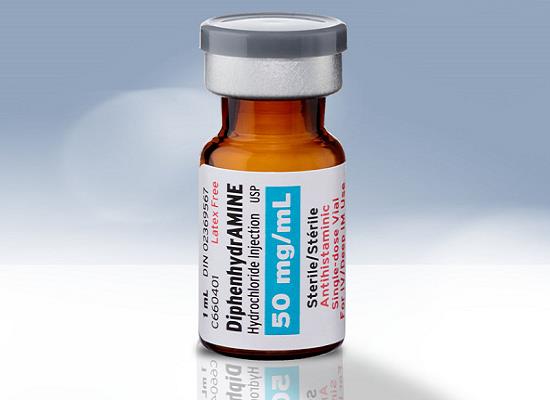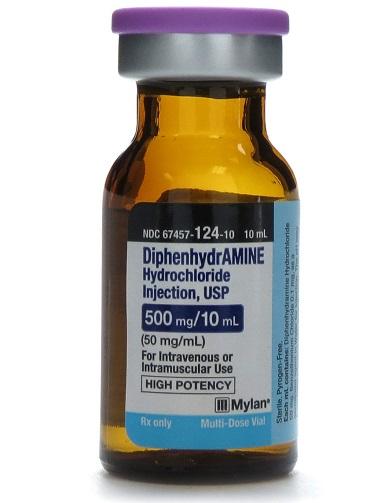Diphenhydramine: mechanism of action, clinical applications and side effects
General Description
Diphenhydramine is an antihistamine drug that blocks the effects of histamine, a chemical released during allergies. By binding to histamine receptors in the brain and body, diphenhydramine prevents histamine from causing allergy symptoms like runny nose and red eyes. It also has sedative effects, causing drowsiness. Clinically, diphenhydramine is used to treat allergies, itching from insect bites, and hay fever. It is also effective for managing sleep disorders like insomnia and symptoms of motion sickness. Additionally, diphenhydramine can alleviate certain side effects of antipsychotic medications. However, it can have common side effects such as drowsiness, dry mouth, and blurred vision, and rare but serious side effects like anaphylaxis. Individuals with specific medical conditions should use diphenhydramine with caution. Overall, diphenhydramine is a versatile medication widely used for its effectiveness in various clinical applications.

Figure 1. Injection of diphenhydramine
Mechanism of action
Diphenhydramine is an antihistamine drug that blocks the effects of histamine, a chemical substance released in response to allergens. Histamine is responsible for the symptoms of allergies, such as runny nose, sneezing, and red, watery eyes. By blocking histamine receptors in the body, diphenhydramine can relieve these allergy symptoms. Diphenhydramine works by binding to histamine receptors in the brain and body, preventing histamine from binding and triggering the release of substances that cause allergy symptoms. In addition to its antihistamine effects, diphenhydramine also has a sedative effect and can cause drowsiness, dizziness, and confusion. Overall, diphenhydramine is a commonly used antihistamine drug that effectively relieves the symptoms of allergies. It works by blocking histamine receptors in the brain and body, preventing histamine from causing allergy symptoms. 1
Clinical applications
Diphenhydramine is an antihistamine medication that is widely used for several clinical applications. Its primary mechanism of action involves blocking histamine receptors in the body, which helps alleviate allergy symptoms and provides relief from various conditions. Clinically, diphenhydramine is commonly used to treat allergic reactions, such as hay fever, hives, and itching caused by insect bites or stings. It can effectively reduce symptoms like sneezing, runny nose, itchy/watery eyes, and skin rashes associated with allergies. Furthermore, diphenhydramine has sedative properties, making it useful for managing sleep disorders, particularly insomnia. Its sedating effect helps induce drowsiness and promote uninterrupted sleep. This makes diphenhydramine a suitable choice for individuals experiencing occasional sleeplessness or jet lag. Moreover, diphenhydramine finds application in the management of motion sickness, as it helps alleviate nausea, vomiting, and dizziness associated with traveling or certain activities. By blocking specific receptors in the brain, it helps inhibit the signals responsible for triggering these symptoms. Additionally, diphenhydramine has been utilized as an adjunctive therapy for some extrapyramidal side effects caused by certain antipsychotic medications. It can help alleviate drug-induced dystonia, parkinsonism, and akathisia, providing relief and improving the patients' overall comfort. Overall, diphenhydramine serves as a versatile medication with various clinical applications, ranging from allergy relief and sleep aid to managing certain side effects of antipsychotic medications. Its effectiveness and wide availability have made it a popular choice among healthcare providers and individuals seeking symptomatic relief in these specific areas. 2
Side effect
Diphenhydramine, while generally safe when used correctly, can have rare but serious side effects. Common side effects include drowsiness, sedation, dry mouth, blurred vision, and decreased appetite. These effects are usually mild and temporary but can persist in some individuals. Serious but less common side effects include anaphylaxis, angioedema, and skin reactions like rashes and hives, which can occur in individuals who are sensitive to the drug. Diphenhydramine should be used with caution in individuals with certain medical conditions, such as glaucoma or prostate disease, as it may increase pressure within the eye or prostate. It is important to follow medical advice when using diphenhydramine and take the medication as directed. Overall, diphenhydramine is effective in relieving allergy symptoms, cough, and cold symptoms, but its potential side effects should be considered. 3
Reference
1. Karrim N, Byrne R, Magula N, Saman Y. Antihistamines for motion sickness. Cochrane Database Syst Rev, 2022, 10(10):CD012715.
2. Hamano H, Ikeda Y, Goda M, Fukushima K, Kishi S, Chuma M, Yamashita M, Niimura T, Takechi K, Imanishi M, Zamami Y, Horinouchi Y, Izawa-Ishizawa Y, Miyamoto L, Ishizawa K, Fujino H, Tamaki T, Aihara KI, Tsuchiya K. Diphenhydramine may be a preventive medicine against cisplatin-induced kidney toxicity. Kidney Int, 2021, 99(4):885-899.
3. Wolfson AR, Wong D, Abrams EM, Waserman S, Sussman GL. Diphenhydramine: Time to Move on? J Allergy Clin Immunol Pract, 2022, 10(12):3124-3130.
Related articles And Qustion
Lastest Price from Diphenhydramine manufacturers

US $0.00/kg2025-09-23
- CAS:
- 58-73-1
- Min. Order:
- 1kg
- Purity:
- 98%
- Supply Ability:
- 1000kgs

US $56.00/KG2025-03-26
- CAS:
- 58-73-1
- Min. Order:
- 1KG
- Purity:
- 98%
- Supply Ability:
- 1-1000kg




